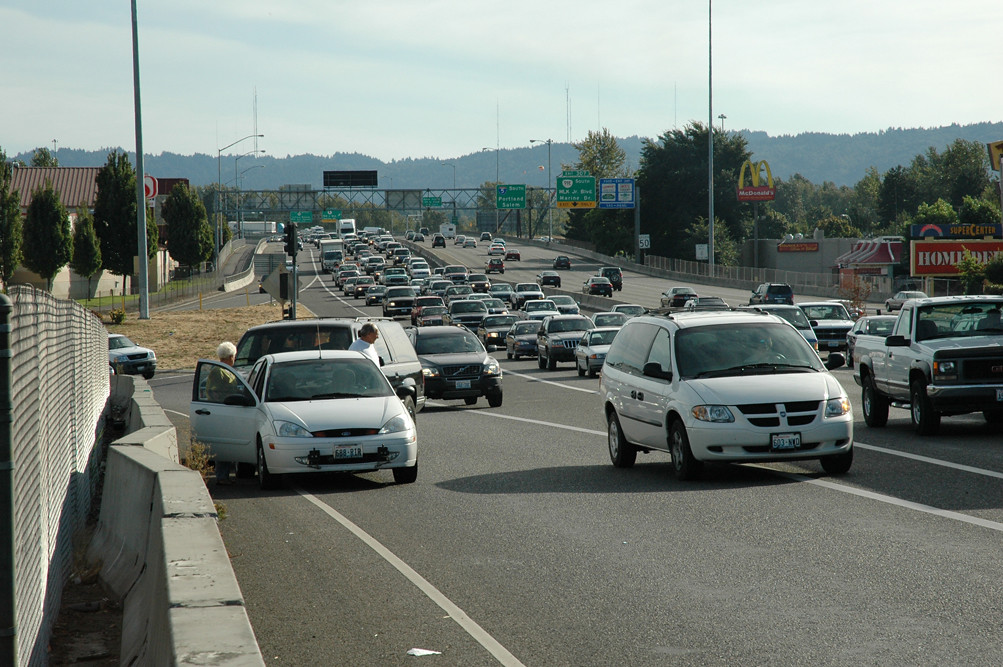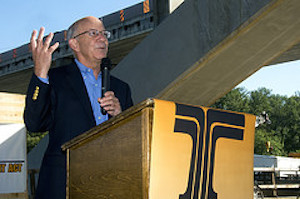
A closer look at Rep. DeFazio’s bid to replace the gas tax with an oil fee

With the Highway Trust Fund rushing toward insolvency, Rep. Peter DeFazio (D-OR) this week stepped up by proposing a policy to address this issue by replacing the gasoline pump tax with a per-barrel oil fee and indexation of the diesel tax that together is sufficient to keep the federal program solvent.
The “Repeal and Rebuild Act” would create a per-barrel fee on oil headed to refineries, with a refund for non-automotive uses and diesel fuel. Although consumers would no longer pay directly, Rep. DeFazio’s office says, this would preserve the “user pays” feature of the highway and transit program by continuing to collect based on fuel use.
“What if we got rid of the tax that people don’t like,” Rep. De Fazio told The Oregonian newspaper, “and move it upstream to something that most people don’t like — the oil industry?”
A barrel tax of $6.75, combined with indexing the diesel tax to rise with inflation, would raise $314 billion over 10 years, Rep. DeFazio’s office says. The proposal includes repeal of the current truck tire excise tax. The barrel fee would rise over time, because it would be “double indexed” to match the growth of the U.S. DOT’s Highway Construction Cost Index and to replace revenue lost as CAFE standards require greater fuel efficiency. Together with indexing the diesel fuel tax, DeFazio’s proposal would raise $104 billion more over ten years than continuing the existing gas tax.
But the changes would not help with the near-term shortfall, Rep. DeFazio acknowledges. The first year would actually raise less than the current gas tax, providing some short-term relief to consumers and oil companies. In fact, it will take until 2017 before we start seeing any positive revenue from this bill.
To cover the short-term gap, Rep. DeFazio would bond $89 billion against future receipts, repaying it over 10 years with the additional $104 billion raised under his proposal.
The gas tax that currently stands at 18.4 cents per gallon and the diesel tax that currently stands at 24.4 cents per gallon funds our country’s transportation system. The gas tax has remained at that rate since 1993 and has since lost nearly 40 percent of its purchasing power because of inflation. As costs have risen, revenue has dropped as vehicles grow more efficient and an increasingly urbanized population drives fewer miles per person. Congress has had to transfer more than $50 billion from the general fund to the transportation fund since 2008 stave off insolvency.
A skeptic might wonder whether it will make a difference to consumers if oil companies simply pass the cost on down the line to the pump. But Defazio believes the oil companies might actually end up taking some of the fees from their profits. “Why are they [the oil companies] fighting so hard against it if they could pass on every penny of it?” he asked.
Rep. DeFazio’s proposal has merit, being as it is an all-too-rare effort to address the longterm solvency of the transportation’s trust and our ability to maintain and build a 21st century network. While it takes courage to lead on raising transportation revenue, recent experience indicates voters may be tolerant of the notion. In two states were revenues have been raised recently, Virginia and Pennsylvania, more than 95 percent of legislators were returned to office after voting for a gas tax increase (more here).
We commend Rep. DeFazio and look forward to his peers joining him to pass the “Repeal and Rebuild Act”.
To read about other current proposals from both sides of the aisle, you can click on our recap here. There is also a summary of the differences between the House and the Senate legislation here.



